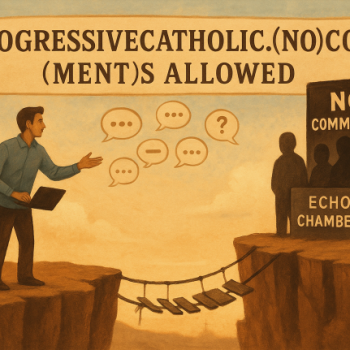Will Episcopal Church split? Bishop thinks he knows
One Friday night not so long ago, as a bunch of us deconstructed world events around a wobbly table down in the Billy Goat Tavern, conversation wandered, as it does, to religion — in this case, the current woes of the Episcopal Church.
A friend of mine entered the verbal scrum, explaining the various machinations he and his bride were undertaking to formally become Episcopalians.
“What an interesting time to be doing that,” I interrupted, as I do. “Aren’t you worried that the Episcopal Church might split or be kicked out of the Anglican club altogether?”
This guy smirked, as he does, looked at me with pity and said something very close to: “The Episcopal Church is not going to split. These are Anglicans. They’re rational people. They’ll talk it out. It’s what they do.”
His argument seemed to be that if a bunch of reasonable Episcopalians can’t talk through the divisive arguments surrounding homosexuality and the spiritual ramifications thereof, nobody can. If they fail, the Methodists, Lutherans and Presbyterians won’t have a prayer.
On Monday, an international commission of leaders of the Anglican Church will reveal its recommendations for how to address problems facing Anglicanism as a whole. These “problems” are, namely, those caused by the Episcopal Church USA’s 2003 consecration of the first openly gay bishop in all of Anglicanism — Bishop Gene Robinson of New Hampshire.
And I’m wondering whether that tavern conversation will prove to be as prophetic as it seemed to be at the time.
Since Robinson was elected bishop, many conservatives — or traditionalists, or biblical literalists, depending on where you stand — throughout the Anglican Communion have lamented passionately that their Episcopal Church in America has skipped off down a misguided lane that can only lead to damnation.
The threat of a schism in the Episcopal Church has since loomed large.
Some bishops in Africa, Latin America and Asia have promised to neither meet nor worship with their American counterparts because of the gay bishop. Some ostensibly have called for the Anglican Communion to kick the American church out the door, or at the very least give it a good chastising.
That international panel of Anglican leaders, known as the Lambeth Commission, has promised that its report due Monday would recommend “radical changes in the way Anglicanism relates to its different constituencies.”
A story in the Times of London in early September, citing alleged insider information from the Lambeth Commission, claimed it will recommend the American church be suspended from the Anglican Communion until Robinson is either removed from his position or retires.
“Don’t believe everything you read in the London Times,” Bishop William Persell, head of the Episcopal Diocese of Chicago, was telling me Thursday morning as we chatted in his office next to St. James Cathedral about the state of the Anglican church in Chicago and around the world.
So, you’re not preparing for the Episcopal Church to be kicked out of the Anglican Communion on Monday, I asked Persell.
“No,” he said. “I don’t believe that will happen.”
As for his own insider info, Persell said he has spoken with retired Bishop David Dyer, the only American on the Lambeth Commission. While Dyer didn’t violate any confidences by revealing the content of the report, Persell said he came away from their conversation with the impression that the commission’s recommendations “won’t please those that want to see us either kicked out of the communion or punished in some way.
“It will have some harsh things to say, I think, about us as a church,” Persell said. But “the report was unanimously adopted by people with widely different views when they came in.”
In other words, if everyone signed on, the recommendations can’t be too drastic. Perhaps it was the result of rational discourse.
Here in the States, what discourse there has been in the last year — at least popularly — about homosexuality, biblical authority, sin, reconciliation and the Episcopal Church has had its share of vitriol and irrationality.
“Can you imagine the pressure someone like that is under,” Persell said of Robinson, whose election and consecration as a bishop he fully supported. “You have to wear a bulletproof vest when you’re consecrated and have a bodyguard with you at all times during the [Episcopal] General Convention? That’s heavy.”
Persell said he doesn’t think his Chicago diocese has suffered through the same level of acrimony as other dioceses — such as the nine Episcopal dioceses, including Downstate Springfield, that have formed the conservative Anglican Communion Network in opposition to Robinson’s consecration and, they say, in defense of traditional biblical values.
Still, the clergy, several members of the vestry and some congregants of one of Persell’s parishes — St. Mark’s in Glen Ellyn — have left the church over issues related to Robinson’s consecration and started an independent congregation. And some Episcopalians in other parishes also have left for the same kinds of reasons, he said.
“For a few of our congregations, it has caused a great deal of pain and distress,” the soft-spoken bishop said. “For some people, the issue is huge and it has impacted our diocese, it’s impacted our life as a church, it’s impacted the Anglican Communion. It is a big issue. But I’m saying that for many congregations, life goes on.”
The Chicago diocese has a sister diocese in southern Sudan, the area that is being ravaged by genocide and starvation fueled, in part, by religious discord.
What has your brother bishop in Sudan had to say about your support of Robinson, I asked Chicago’s bishop.
“The bishop of Renk [Sudan] told me, ‘We can disagree on this issue. Families have disagreements, and they still stay at the table and love each other and talk about it,'” Persell said.
Some say talk is cheap and that actions speak louder.
But words of truth, particularly when they’re spoken in love, can build bridges.
And move mountains.
Next week, the conversation continues.
Copyright © The Sun-Times Company
All rights reserved. This material may not be published, broadcast, rewritten, or redistributed.















